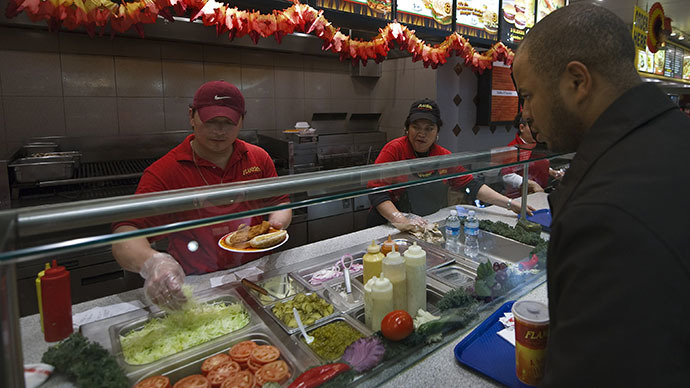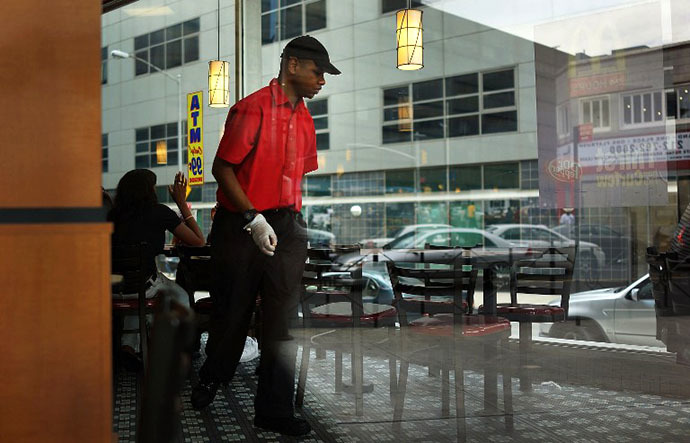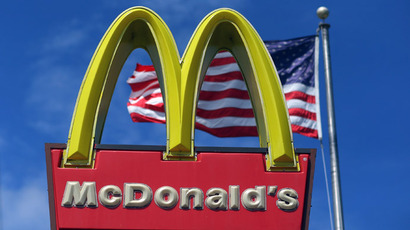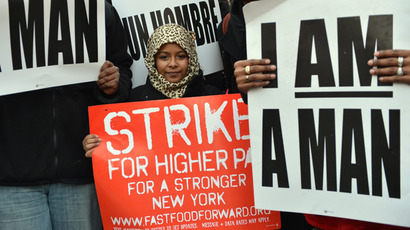Fast-food workers walking off the job in 100 US cities

Organizers expect fast-food workers throughout the US to walk off the job on Thursday in a show of solidarity against what they allege are immoral industry practices, and as part of the movement lobbying for a $15 federal minimum wage.
At least 100 cities are scheduled to participate in the demonstration, but one of the central locations will almost certainly be New York City. An estimated 57,000 fast food employees work in the Big Apple, where the median industry wage amounts to $8.89 an hour, a number Allison Kilkenny of The Nation writes is the lowest of any job in the city.
Such demonstrations began occurring at a steady pace in New York last year and the movement has since spread through the country. At strikes this past August in 60 cities, including Washington DC, workers have called for the minimum wage to be raised, as well as the right to unionize and for the ability to work without fear of retaliation.
The federal minimum wage of $7.25 per hour has not been raised since 2009, leaving workers to contend with inflation and steadily increasing prices for basic goods and living expenses.
Economists at the University of California Berkley published a report in October indicating that over half of the US workers employed by fast food restaurants rely on government assistance to survive because their paychecks fail to cover basic needs. Most fast food workers (68 percent) are single or married adults not currently attending school and 26 percent are raising children - debunking the stereotype that teenagers fill most of said positions.
“I’m tired of working for $7.25,” Mary Coleman told The Nation. “I can’t take care of my household, I can’t even take care of myself.”
The 59-year-old Popeye’s employee said she lives with her daughter and two grandchildren, yet still has to rely on food stamps to help pay for treatment for her heart condition.
“Every day struggles are being able to keep food on the table, being able to get the necessities that’s needed for every day living,” she said. “And if you need to go to the doctor, you can’t afford that either.”

A number of notable Republican lawmakers have refused to support raising the minimum wage. New Jersey governor Chris Christie was reelected in November by an overwhelming majority, yet more than 60% of New Jersey voters reported they support raising the minimum wage, a policy the governor opposes.
US President Obama lent his support to the movement to raise the minimum wage during a speech Wednesday delivered in one of the poorest sections of Washington DC. He said the “relentless, decades-long trend” of growing social inequality has made the gap between the rich and poor “the defining challenge of our time.”
“That’s why it’s well past the time to raise a minimum wage that, in real terms right now, is below where it was when Harry Truman was in office,” he said. “I’m going to keep pushing until we get a higher minimum wage for hardworking Americans across the entire country. It will be good for our economy. It will be good for our families.”
Charleston, South Carolina and other cities in the South, which has traditionally been opposed to worker’s rights demonstrations, are also expected to join in Thursday’s protest.
Many workers said it will be the third, fourth, or fifth time they are walking off the job. Some said their motivation was not just to be able to support themselves with a fair wage, but also an attempt to change how corporations like McDonalds will shape the future.
“If we sit back and leave everything to the younger generation, we’ll never get anywhere,” Ms. Coleman said. “At this point, it seems like a majority of the younger generation thinks that their voices don’t matter. I want to let them know that their voice does matter.”














